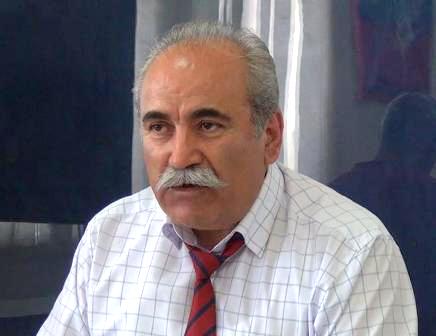 Turkish President Recep Tayyip Erdogan made a sensational statement at the commemoration of the 79th anniversary of the death of the founder of the Turkish Republic Mustafa Kemal Ataturk. “Turkey could not protect its borders at the beginning of the national liberation struggle,” Erdogan said. – The main reason for the threats emerging on the southern borders of Turkey is a departure from the goals of the liberation struggle.
Turkish President Recep Tayyip Erdogan made a sensational statement at the commemoration of the 79th anniversary of the death of the founder of the Turkish Republic Mustafa Kemal Ataturk. “Turkey could not protect its borders at the beginning of the national liberation struggle,” Erdogan said. – The main reason for the threats emerging on the southern borders of Turkey is a departure from the goals of the liberation struggle.
If this were not the case, then today Turkey would be on a completely different level. The forces that forced Turkey to withdraw from the borders of the liberation struggle are now trying to force Ankara to return to the terms of the Treaty of Sevres. ” And he added that, “Considering the situation in Syria and Iraq, I believe that Turkey has no right to ignore the threats coming from the regions it claimed during the national liberation struggle”.
Let us note that Erdogan often returns to these pages of national history. In the autumn of 2016, he already called for a revision of the Lausanne Treaty of 1923, which formalized the collapse of the Ottoman Empire, when Turkey lost control over the provinces that were once part of the Ottoman Empire, including Arabia, Egypt, Sudan, Tripolitania, Trans-Jordan, Palestine, Lebanon, Syria , the islands in the Aegean Sea and Mesopotamia.
However, then this statement by many political forces in the country, especially the opposition, was interpreted as “Erdogan’s desire to expose himself as a leader who again took the path of national liberation war with the goal of rallying the nation around him.” At the same time, some experts saw Erdogan’s aspiration to “straighten the borders of present-day Turkey in the formation of a new legal order in the Middle East in the course of the” Arab spring “. And what did the Turkish president mean now and why did he again start talking about the Treaty of Sevres with the reference to “forces trying to return Ankara to the terms of this treaty”?
Recall that on August 10, 1920 in the French city of Sevres, the Entente countries signed a peace treaty with the Ottoman Empire, which formally formalized the division of its possessions in Europe and the Middle East. He foresaw the establishment of a Kurdish state in the region, and also, following the arbitration award of US President Woodrow Wilson of November 20, 1920, to Greater Armenia. Wilson introduced to the Allies the proposal that two-thirds of the Wilayettes Wan and Bitlis, almost the whole Erzrum vilayet, a significant part of the Trebizond vilayet, including the port, crossed to Armenia.
As a result, the territory of the “Wilson” Armenia could be about 150 thousand square meters. km and got access to the Black Sea. And with regard to independent Kurdistan, it was supposed that England, France and Turkey would jointly define its borders. However, the Treaty of Sevres was never ratified.
Now the epicenter has moved to Syria, where the Kurds, who are actively supported by the US, are in favor of granting them autonomy status. If this idea is implemented, according to Al Jazeera, the second Kurdish autonomy will appear in the Middle East, and eventually Turkey will have to convert from a unitary state to a federation. After that, the Kurds can take a course on independence. That is why Ankara was seriously alarmed by the statement of Syrian Foreign Minister Walid Muallem that “Damascus is ready to discuss the idea of giving the Kurds more power after the end of the fight against IGIL” (an organization whose activities are banned in Russia) while “maintaining the state sovereignty of Syria”.
Of course, it is difficult to foresee the further development of events in Syria, Iraq, and Turkey in the reality that is now being formed. It is not by chance that they are once again recalling the new map of the Middle East, published in 2013 in the newspaper The New York Times by the American scientist of the US Institute of Peace Robin Wright. He believes that the result of the ongoing “Arab Spring” in the region should be the emergence of 14 states out of the existing five in the number of really existing “powerful nationalisms” covered by the “whirlpool of the civil war”. In addition, according to Wright, “interconfessional confrontation leads to a split between Sunnis and Shiites in such a scale that the modern Middle East has not yet seen.”
But so far the following is indisputable. The Middle East region, connected with an artificial and not coinciding with the areas of ethnic settlement of borders, has come into motion, which is unlikely to be stopped by anyone. Changes in the region directly affect the states of Transcaucasia, primarily Azerbaijan and Armenia. If the foundations of the Treaty of Lausanne collapse in 1923, both the Moscow and Kara agreements of the 1920s, which created the borders between Turkey and the Transcaucasian states, will collapse.
And then they will remember the Treaty of Sevres in 1920, by which, by the way, there is no signature of Russia. If now the south-east of Turkey passes under the control of the Kurds, the transfer to the Turks of Kars, Ardagan, Artvin and Surmalinsky County, stipulated by the Moscow Treaty, and Nakhichevan as a protectorate of the Azerbaijan SSR (now Azerbaijan), may be put under question.
Theoretically, the following geopolitical outlines can be identified: the Republic of Artsakh (Nagorno-Karabakh), the Eastern Armenian Republic are allies of Russia, the Western Armenian Republic is under the Western protectorate. But, we repeat, all this will be directly connected with the processes of geopolitical transformation in the Greater Middle East. Moscow must be prepared for the alleged course of events, not only politico-military.
Finally, it can not be ruled out that the West will propose signing, under certain circumstances, a new agreement such as Sykes-Pico of 1916 on the division of spheres of influence in the Middle East. It is time to take the most serious historical decisions. President Erdogan will arrive in Sochi on November 13 at the invitation of Russian President Vladimir Putin. So everything is not easy.
ORIGINES SOURCE – IA REGNUM







